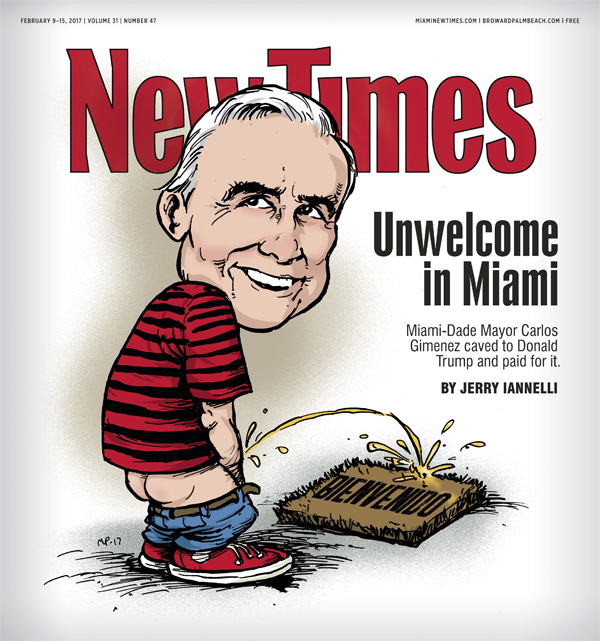City of Miami could crack down on Airbnb in proposed ordinance by Mayor Tomas Regalado
At the start of last week, room-sharing company Airbnb appeared to have a good relationship with the city of Miami — smoother than Miami Beach, where city officials have enacted an ever-expanding series of restrictions on rentals at short term.
But Miami City Mayor Tomás Regalado last week proposed an ordinance cracking down on Airbnb-style “vacation” rentals. Regalado’s new law would ban short-term rentals in about two-thirds of the city. This would also subject any Airbnb, Homeaway or other
“We thought we were sitting at the table with the city,” Airbnb spokesperson Ben Breit said. “But now it’s like we went to the bathroom for a second and came back to find the table was gone.”
Regalado did not immediately respond to new times‘ call asking for a comment. The item was originally scheduled for the February 23 city commission meeting, but has since been removed from the agenda.
If passed, the mayor’s ordinance would ban rentals of less than 30 days in all areas of the city with a “T3” or “suburb” zoning designation. According to city zoning atlas, the area includes huge swathes of the northern, western and southwestern sections of the city. (Advertising a short-term rental in any of these areas online or on a mobile app such as Airbnb’s would also be illegal.)
Airbnb rentals in other zoning areas would be permitted, but owners would need to apply for a certificate of compliance. This would involve sending the city a host of documents, including a copy of the deed to the owner’s home, a 24/7 phone number, proof of registration with the Florida Department of Miami-Dade Revenue and Sales and Rental Tax Services, proof of license with the Florida Department of Business and Professional Regulation, and other documents.
Unregulated vacation rentals “can have a serious impact on the health, safety, well-being and quality of life of those directly affected by the rentals and the community in which they are located,” the order states. .
According to the bill, rental properties would also be subject to city zoning codes, including laws governing the number of occupants per bedroom per square foot, the size and maintenance of swimming pools on the property, and the garbage storage. If approved, an owner would be legally responsible for monitoring their vacation rental property
Rental homes would also be subject to annual municipal inspections.
All of this, according to Airbnb, places an extreme burden on the typical vacation renter. Breit says the average Miami landlord makes about $6,000 a year renting on his platform.
“Nobody quits their day job because of this,” he says. “These are ordinary people, so whatever the city process has to be, it has to be fair and simple and clear. But that’s not what you’re looking at here. I say it all the time: we want to regulation. We want to be taxed. But we have serious concerns about it.”
It’s surprising that Regalado chooses to dip its toe into the confusing waters of Airbnb regulations – the city of Miami Beach has been battling tenants, landlords, hoteliers and the home-sharing company for most of the year. Latest: Rental periods of less than six months and a day have long been illegal in most residential areas of the city, and the city began levying $20,000 fines on violators this year. So far, he’s nailed the owners for over $3 million.
But Breit says there’s another reason Airbnb is so concerned about Regalado’s ordinance on the mainland: The text of the bill is almost a verbatim photocopy of an ordinance passed to regulate rentals of vacation in Fort Lauderdale.
“There are instances in this order where they even forgot to change things from ‘Fort Lauderdale,'” Breit says.
In fact, the ordinance was clearly copied and pasted: One section cites an official adoption date of August 18, 2015, the day the Fort Lauderdale law was passed. Another section seems to have been deleted and left blank by accident:
a. The residential property has an effective and valid license as a public lodging establishment vacation rental classification issued by the Florida Department of Business and Professional Regulations before August 18, 2015; and,
b. The residential property is not in violation of any section of the city code; and,
vs. An application to register the residential property as a vacation rental has
be filed in accordance with Article [no section cited] and all applicable fees have been paid…
Breit adds that Airbnb estimates only 5% of Fort Lauderdale’s online vacation listings are properly registered with the city — and says that’s because the rules are far too difficult to follow. He wants Miami to work with the company to help regulate the platform smoothly. In Chicago, for example, the company has set up a
“We don’t come in saying, ‘One size fits all,'” he says. “We know Miami is different from New York, Chicago, or even Miami Beach. Cities have different needs and priorities, and we’re willing to work with them on an individual level.”
Instead, Breit says, Regalado submitted the order without consulting Airbnb.
Here is a draft of the bill:


Comments are closed.